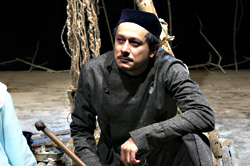In the Canadian TV series Slings and Arrows (DVDs of which are traded among theater folk with subversive glee), there’s a great exchange between Geoffrey, the burned-out artistic director of a Shakespeare festival, and Nahum, a janitor at the festival who ran a company of his own back in Nigeria. Geoffrey moans that his own production of A Midsummer Night’s Dream lacks “truth.” Nahum responds that “truth” can be difficult in theater; one of his Nigerian shows was “perhaps too openly critical of the Abacha regime…the soldiers came and burnt our sets and beat the actors with sticks.” After a glum pause, Geoffrey replies, “Thanks for the perspective.”
America has never taken particularly well to political theater. Even in its heyday in the 1930s, when playwrights like Elmer Rice, Lillian Hellman, and Clifford Odets dominated the stage, plays focused more on social criticism than full-throated cries for social change. Bertolt Brecht, the greatest political playwright of the past century, inspired generations of American directors and playwrights with his innovations of style and dramatic technique, but his plays are rarely performed outside of college drama programs.
Brecht didn’t just want his theater to entertain or engage; he wanted to change people’s minds. An unapologetic socialist, he had an uncomfortable time under the Nazis, so he fled to the U.S., and later found that America in the McCarthy era wasn’t a lot more welcoming. So he fled back to postwar Germany and ended his days well-funded but artistically stagnant under the Communists. This isn’t the sort of career most artists would seek out—doing your art in a country where the government is itching to lock you up, or worse.
One person who did embrace such a career was Mark Weil, the founder and former artistic director of the Ilkhom Theatre, which is coming this week to ACT from Uzbekistan with two plays that he co-authored. Theater in Uzbekistan is not the safest of professions, even when your company is as popular as the Ilkhom, which was founded in 1976 and tours internationally. The country has not one but two repressive forces that get touchy about Western ideas. First there’s the head of the government, Islam Karimov, an autocratic leader with a fearsomely bad human-rights record. Then there’s religion: The culture is predominantly Muslim, and has had a resurgence of fundamentalism in the past few years, thanks in part to America’s recent adventures in the Middle East.
Given all of this, you might expect that Weil would stick to shows that were popular and safe, like his acclaimed comedies and adaptations of Shakespeare. Instead, he also presented new plays. In one, a traditional Islamic marriage goes awry because the young man is gay. In another, boys are taught to impersonate women in a traditional dance called bacha because women aren’t allowed to perform.
These are the two shows that Ilkhom is bringing to Seattle, White White Black Stork and Ecstasy With the Pomegranate.
Weil, a part-time Seattle resident for several years, made his initial connection to ACT through Sarah Nash Gates, who runs the UW’s drama program, which has a study-abroad relationship with Ilkhom. She in turn introduced him to Kurt Beattie, head of ACT. It’s because of this relationship that the Ilkhom is coming to Seattle. It’s an exciting collaboration with Weil’s company, but unfortunately he isn’t around to see it: Last October he was stabbed to death in front of his apartment in Tashkent by two unknown assailants. (This might have been random. Or it might have been a sign that it’s a dangerous thing to be a theater artist and piss off certain people in Uzbekistan.)
Beattie stresses that neither of the two shows presented by the Ilkhom are traditional political theater—no calls for workers to throw off their chains, or even the sort of superbly detailed study of politics the company gave us last season with David Hare’s Stuff Happens. His main connection to the work is that he finds the productions are richer than most of what American audiences are used to. “There’s a level of depth that’s hard to come by in this country,” he says. “It has to do with lots more process in developing the shows. There’s something of the old Soviet system there, in that work doesn’t get done in a day. It’s mounted slowly and carefully and then goes into repertory where you refine it.”
In parts of the world like Uzbekistan, you don’t have to do overtly political theater. Theater, in and of itself, is a political act. Totalitarian regimes have always been wary of the theater, if for no other reason than that a large group of people in a room might find themselves roused to think things they shouldn’t, or even to take action. As far as it may be from an American’s experience of theater, the difference between a play and a rally is closer than most people suspect.








